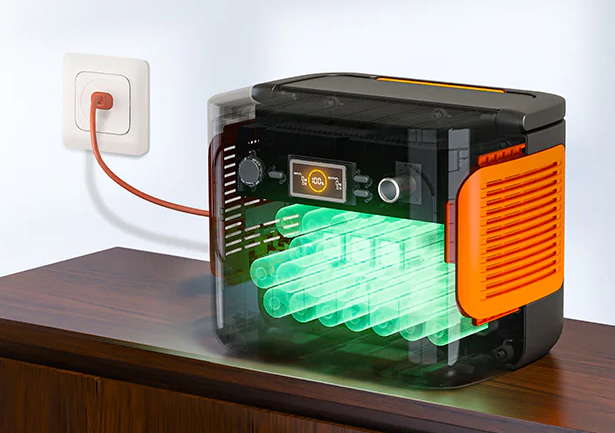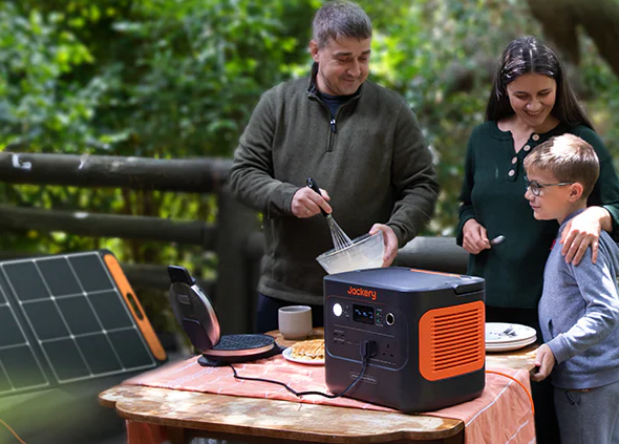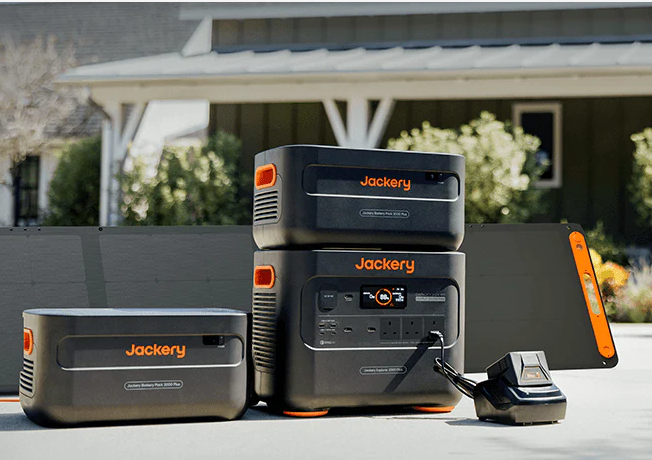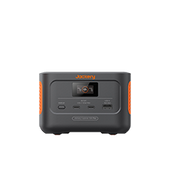Why Recommend Using Home Generators to Power Electric Ovens
Electric ovens have become a staple in family kitchens due to modern features that provide a fast and enhanced cooking experience, from quick weeknight dinners to elaborate Sunday roasts. But despite their efficiency, these appliances heavily rely on traditional power sources to meet their high electricity consumption needs. Therefore, switching to clean and renewable options — such as solar-powered home generators — is more beneficial because they can power the kitchen appliances effectively and contribute to a more sustainable lifestyle and a lower utility bill. Read ahead as we explore this growing need for home generators and how they help reduce overall power consumption in your kitchen.

Energy Needs of Electric Ovens and The Growing Need for Home Generators
Electric ovens are the most power-hungry electric appliances in our homes with their electric heating elements. The routine use of ovens for baking and cooking further contributes to their high power consumption. Except for wattage, the total amount of energy used by the oven depends on factors such as:
- Energy Efficiency
- Usage Technique
- Usage Frequency
- Cooking Temperature
One way of slashing oven-associated electricity costs is the conscious use of electric ovens with serious consideration of renewable alternatives. But if you need a quicker solution, investing in solar-powered home generators should be your first choice. Here is how this home backup generator will benefit you in the kitchen!
- Unlimited Power for Kitchen Appliances
Due to expandable battery capacity and long-lasting battery life, solar-powered home generators can power various kitchen appliances, including electric ovens, microwaves, rice cookers, toasters, and refrigerators. You can even run your appliances amid extended power outages as these home backup generators store sufficient energy during daylight for later use.
- Renewable Energy Source
With solar-powered home generators, you can reduce your dependence on fossil fuels and other conventional grid systems. This degree of freedom is critical to restricting electricity expenses and supporting your culinary needs when faced with a sudden power crisis.
- Contribution to Green Environment
These generators provide sustainable energy by converting sunlight into functioning voltage. It allows us to operate unlimited kitchen appliances with reduced carbon footprint or other environmental harms.
- Long-Term Cost Savings
Buying a solar-powered home generator may demand an upfront revenue, but it's generally considered a beneficial long-term investment. The savings over time will exceed the original cost and optimize your home's electricity expense in the long run.
How Many Watts Are Required for an Electric Oven?
To break it down for your ease, we have divided the energy cost for small, medium, and large ovens into categories. Have a look below to understand!
- Small Electric Oven
With compact size and less power consumption, micro electric ovens are ideal for cooking in small kitchen spaces and preserving energy. The average amount of toaster ovens falls by about 800w.
- Medium Electric Oven
Medium electric ovens are multipurpose and have a larger capacity. They are more versatile in handling a variety of cooking tasks and help you cook batch meals while limiting total electricity costs. The typical power requirement for a moderate-size oven is around 1200w, much less than needed to operate large electric appliances.
- Large Electric Oven
Cooking elaborate meals is challenging with small ovens as you need plenty of room to fit in the dishes. However, a large capacity can solve all your problems with ample space and energy-efficient features. The only downside of switching to large electric ovens is that they consume maximum power (approximately 1500W), which can significantly raise your electricity bills, especially against the backdrop of energy shortage and climate change.
Investing in solar-powered home generators is the perfect solution to help control the rising kitchen bills in case your family relies on electric ovens. Jackery gives you access to the ultimate Jackery Solar Generator 1000 Plus — ideal home generators for powering your ample kitchen needs in a more energy-efficient and eco-friendly way. Let us examine some of its features and see why it should be your go-to power generator for homes!
- Delivers 2000Wof uninterrupted power
- Sustains 4000 charge cycles due to ultra-long lithium iron phosphate battery
- Releases minimum carbon emissions and zero toxic fumes
- Guarantees upgraded safety because of innovative ChargeSheild technology
- Provides emergency power backup during sudden electricity outages
All in all, the Jackery Solar Generator 1000 Plus eliminates dependence on traditional grid systems and offers more autonomy on your electricity expenses over the years.
How Much Electricity Do Electric Ovens Consume?

For electricity consumption, you can multiply the power (kW) by the hours you operate the electric oven in a month, week, or day. The table below shows how to calculate the energy consumption of your electric ovens. Note: The data below is for your reference to the calculation methods and should not be taken as the real energy consumption situation.
kWh = power (in Kilowatts) x time (in hours)
|
Power Rating of Electric Oven (W) |
Power Rating of Electric Oven (kW) |
Usage Frequency of Electric Oven Per Day (Hours) |
Daily Electricity Consumption of Electric Oven (kWh) |
|
800 |
0.8 |
2 |
1.6 |
|
1200 |
1.2 |
2 |
2.4 |
|
1500 |
1.5 |
2 |
3 |
Further, you can determine the total electricity cost by multiplying the final value in kWh by your area’s electricity rate. The standard electricity price in the UK stands at around 27.35p/kWh, according to a report by an independent British energy regulator [1].
Factors Affecting the Electricity Consumption of Electric Ovens
The power consumption of electric ovens can vary depending on the specific type or model you prefer. Specific factors that determine the number of watts your oven consumes can include size and capacity, energy efficiency, and temperature. Read below to learn how to optimize the use of electric ovens along with the future integration of home generators of renewable energy.
- Size and Capacity
Smaller ovens tend to heat up and cook food more rapidly due to their compact size. At the same time, their larger counterparts require additional time, leading to more electricity consumption. Therefore, it’s best to consider your power requirements before the final purchase and manage your electricity expenses more effectively.
- Energy Efficiency Level
Energy efficiency indicates the oven's capacity to cook food using as low energy as possible. Not only does it help save our electricity bills, but it also contributes toward a greener environment due to a lesser carbon footprint.
Energy-efficient ovens can reduce overall power consumption due to the following reasons:
- Better insulation to retain more heat in less power,
- Convection technology for even hot air circulation over the food,
- Precise temperature settings and digital control options,
- Standard energy certifications from the regulatory authorities
- Considerable size and capacity for quick heating
It is essential to remember that besides the intelligent features, energy efficiency equally depends on how you utilize the oven. The following points will help you maintain the oven’s efficiency and reduce overall costs:
- Regularly clean your oven to avoid residue buildup.
- Let the food cook uninterrupted once you switch on the oven.
- Preheat when the recipe mentions to do so
- Cooking Temperature and Time
The time and temperature required to cook meals also influence your oven’s electricity consumption. Electric ovens consume maximum energy when maintaining higher temperatures for an extended period. On the flip side, sustaining moderate heating levels for brief intervals requires less electricity. Therefore, adjusting your oven to a suitable temperature is vital to save on energy bills in the future with home generators.
- Frequency of Use
People use electric ovens for different purposes, from weekend baking sprees to regular cooking. The rule of thumb is the more you use your oven, the more it will add to your home’s electricity expenses. However, using energy-efficient electric ovens can reduce costs even with extended usage compared to traditional options.
- Daily Maintenance
Constant heating and cooking of food in the oven can accumulate grease or debris, resulting in severe consequences. Some issues include:
- Unpleasant stench from chemical buildup
- Smoke
- Carbonated fumes
Besides compromising the nutritional quality of food, they also reduce the oven's efficiency over time. The decreased efficiency means the oven will need more energy to keep the temperature at the desired level, which raises electricity consumption. You can sidestep these challenges if you set a daily maintenance routine for your oven and clean it at regular intervals.
- Food Quantity
Maintaining the desired heating temperature requires more energy when you stuff the oven with a large quantity of food, but it can help save the net electricity cost. You can cook food in large batches (two or three dishes simultaneously) as it will reduce the average use of the oven, saving time and power consumption in return.
FAQs About Electric Ovens and Home Generators

- Does the Electric Oven Consume a Lot of Energy?
Yes. Electric ovens consume a lot of energy, but the amount can vary due to fluctuation in several factors, such as the model and size of the oven, frequency and duration of usage, cooking temperature, and the quantity of food you utilize per session.
- How Do You Maximize the Energy Efficiency of Electric Ovens?
The way you use your appliances determines how much energy you can save. Here are a few tips to maximize the energy efficiency of your electric ovens.
- Clean your oven at regular intervals to avoid food dirt and debris.
- Make sure the oven door remains closed throughout the cooking session.
- What Capacity of The Home Generators Is Required for an Electric Oven?
Electric ovens are power-hungry, so they need high-capacity home generators to meet their electricity consumption needs. You can determine the generator capacity by checking the average power rating of the oven. For instance, if the electric oven is rated at 1,500 watts, a generator with a power output of at least 1,500 watts or higher would be suited to power the oven. The Jackery Solar Generator 2000 Plus boasts a 2024.8Wh LFP battery capacity with advanced IBC technology for fast charging. Furthermore, it supports three AC outputs of 3000W Max, rendering it an ideal electric generator for home for powering large kitchen appliances such as electric ovens or refrigerators.
Conclusion
How much electricity does an electricity oven consume? The answer depends on what type of oven you have and how you use it. Therefore, it is best to understand these aspects and make informed decisions on home generators of renewable energy to balance your power consumption needs and long-term energy saving. The Jackery solar generators are superb options in this regard. Our products feature robust capacity and large power output that perfectly match the high-energy requirements of electric ovens, helping families to integrate them into eco-friendly family living while also significantly reducing total electricity costs.
So, what are you waiting for? Browse our catalogue now to choose your go-to home generators for kitchen appliances. Happy shopping!
References
- Ofgem/2023. Energy price cap. Availableat https://www.ofgem.gov.uk/energy-price-cap#:~:text=Electricity-,27.35%20pence%20per%20kWh,-53.37%20pence%20daily. (Accessed on Nov. 30, 2023)






















































































